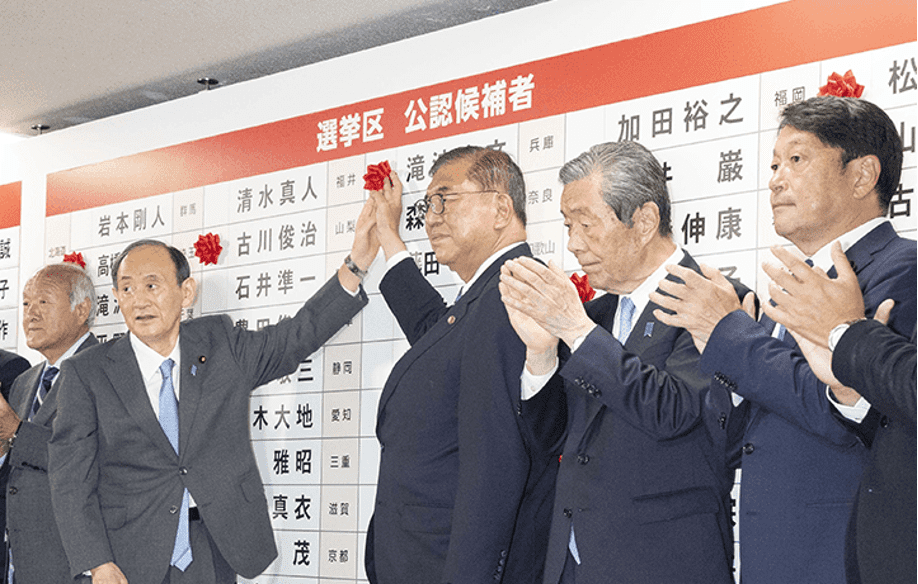
Japan’s Governing Bloc Faces New Challenges Following Upper House Defeat

The BGA Japan Team, led by Kiyoaki Aburaki, wrote an update to clients on the ruling Liberal Democratic Party’s recent political challenges after a defeat in the upper house election.
Context
- Japan held an election for the House of Councilors July 20 in which the ruling coalition — the Liberal Democratic Party (LDP) and Komeito — secured only 47 seats, falling short of the 50 needed to maintain a majority in the upper house. This marks the first time in history that Japan’s ruling parties held a minority in both chambers of the Diet. Looking ahead, the focus will be on how the coalition can secure cooperation from opposition parties, potentially by expanding the coalition framework. Options are also being considered to bring independent winners into the LDP and attempt to reach the 50-seat mark through additional endorsements.
- Significant uncertainty surrounds Prime Minister Shigeru Ishiba’s political future for three key reasons. First, the LDP suffered historic defeats in both the October 2024 general election and the recent upper house election. No previous LDP president has remained in office after leading the party to even one such loss; only Ishiba has done so. Second, calls within the LDP for Ishiba’s resignation have already begun to surface, including from former Prime Minister Taro Aso. In addition, former Economic Security Minister Sanae Takaichi has signaled her intention to run in the upcoming LDP leadership election.
- These developments increase the prospect of heightened intraparty maneuvering, particularly from the sidelined faction of the late Prime Minister Shinzo Abe, which has been marginalized under Ishiba’s leadership. Third, major opposition parties such as the Democratic Party for the People (DPP) have made it clear they are unwilling to cooperate with the Ishiba administration at this stage. Given that the ruling coalition is now a minority in both chambers of the Diet, securing opposition cooperation is essential for the LDP to maintain effective policy control.
Significance
- The first key factor shaping Japan’s political trajectory will be whether Ishiba remains in office. Although Ishiba has formally expressed his intention to stay on, voices within the LDP are increasingly calling for him to take responsibility for the election outcome. Within the opposition, Yuichiro Tamaki — leader of the DPP, which made significant gains in the election — said during a TV broadcast on election night that his party “cannot cooperate with the Ishiba administration.” Without opposition cooperation, the LDP-Komeito coalition, now a minority in both houses, will face serious limitations in its ability to govern effectively.
- A new LDP president is expected to be selected by mid-August if Ishiba steps down. To prevent a prolonged political vacuum, the election will likely be conducted primarily among LDP lawmakers. However, to avoid criticism of opaque, backroom decision-making and to bolster the legitimacy of the new leader, rank-and-file party members and grassroots supporters are expected to have a role in the process. Leading contenders include Sanae Takaichi, who outpaced Ishiba in the first round of last year’s leadership race; Chief Cabinet Secretary Yoshimasa Hayashi, a key figure in the current administration; former LDP Secretary-General Toshimitsu Motegi; and rising star Takayuki Kobayashi. There is also a persistent faction within the party calling for the return of former Prime Minister Fumio Kishida
Implications
- While the ruling and opposition parties may differ in their approaches to tackling inflation, key policy areas such as the digital transformation, green transformation and economic security continue to enjoy broad bipartisan support. For instance, the JPY 10 trillion ($67.3 billion) policy support package for artificial intelligence and semiconductors, passed this spring, received backing from all major political parties. Similarly, the promotion of autonomous driving has cross-party endorsement, with some opposition parties including early implementation of Level 5 autonomy in their platforms. Strengthening supply chains — including those for critical minerals — also benefits from bipartisan consensus. Even in the event of a change in government or a shift in the ruling coalition, Japan’s political culture places a strong emphasis on policy consistency and continuity. A symbolic example is former Prime Minister Tomiichi Murayama, who, upon taking office in 1994 as leader of the Socialist Party, reversed his party’s long-standing position and acknowledged the constitutionality of the Self-Defense Forces.
- Despite its defeat in the recent Upper House election, the LDP remains the largest party in both chambers of the Diet. Following Prime Minister Abe’s resignation in September 2007, Japan experienced a period of LDP prime ministers rotating almost annually. This instability was largely due to the coalition’s loss of a majority in the upper house, combined with the opposition Democratic Party holding the largest bloc there — greatly limiting the LDP’s legislative influence. The LDP’s plurality in both houses indicates that the coalition retains a meaningful degree of policymaking leadership.
- A post-election split within the LDP would seriously destabilize Japanese politics. In 1993 and 2009, such internal fractures led to the party’s loss of power and broader political realignment. In the current case, if Ishiba remains in office and brings the left-leaning Constitutional Democratic Party (CDP) into the coalition, conservative lawmakers may leave the LDP. However, CDP leader Yoshihiko Noda said that forming a coalition with the Ishiba administration — which was rejected twice by the public in last year’s lower house election and this year’s upper house election — was “out of the question.” As long as the LDP maintains internal cohesion, political uncertainty will likely be limited.
We will continue to keep you updated on developments in Japan as they occur. If you have any comments or questions, please contact BGA Japan Managing Director Kiyoaki Aburaki at kaburaki@bowergroupasia.com.
Best regards,
BGA Japan Team

Kiyoaki Aburaki
Managing Director
Kiyo understands the Japanese business community inside and out from his three decades working for Japan’s most powerful business organization, Keidanren. He covers international trade and investment, defense and aerospace, information technology, entrepreneurship, deregulation and data privacy policy. He also played a leading role in developing and implementing political strategies for the private sector. Kiyo has led Keidanren’s strategic international initiatives since 2013, and most recently headed up the federation’s international engagement. He worked closely with former Prime Minister Yasuo Fukuda to establish Japan’s Track 1.5 dialogues with the United States and China. The dialogues produced important results by strengthening ... Read More
×























